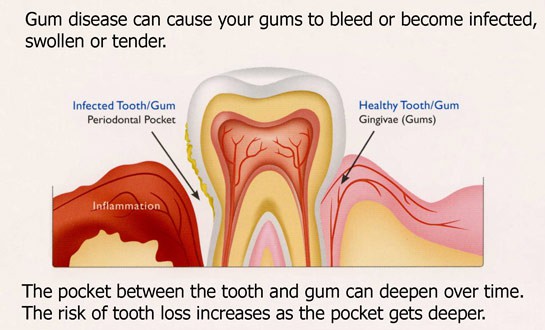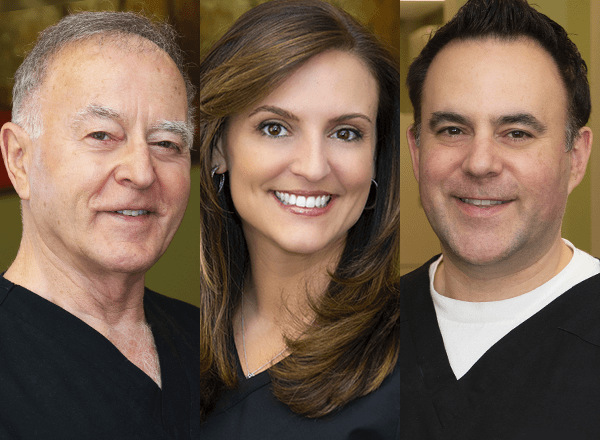Scaling & Root Planing in Chicago, Evanston & Skokie

Restore Gum Health and Stop Gum Disease in its Tracks
Scaling and root planing offer a transformative journey toward restoring oral wellness after periodontal disease. This comprehensive procedure serves as a beacon of hope for individuals grappling with the ramifications of gum disease. At Contos Smile Center, Dr. Contos and our team help stop your gum disease in its tracks. Call our Chicago, IL, office at (773) 973-0531 to learn more.
What are Scaling and Root Planing?
Scaling and root planing represent specialized dental procedures to treat periodontal disease, commonly known as gum disease. They serve as proactive measures to address and manage this oral condition effectively.
- Scaling involves the meticulous removal of plaque and tartar deposits from the surfaces of the teeth, especially those areas beneath the gum line that regular brushing or flossing might not reach.
- Root planing focuses on smoothing out the tooth roots after removing tartar and bacteria. Smoothing the root surfaces helps reattach the gums to the teeth, preventing the accumulation of bacteria and facilitating the healing process of gum tissue.
Benefits of Scaling and Root Planing
There are several benefits to deep cleanings, such as:
- Halting Disease Progression: By eliminating plaque and tartar, scaling and root planing stop the advancement of periodontal disease, preventing it from worsening.
- Gum Health Improvement: These procedures help reduce inflammation, irritation, and bleeding of gums caused by gum disease, promoting healthier gum tissue.
- Prevention of Tooth Loss: Early intervention through scaling and root planing can prevent the progression of gum disease, thereby reducing the risk of tooth loss.
- Freshened Breath: Removing bacterial deposits that cause gum disease can significantly improve breath freshness and overall oral hygiene.
Candidacy for Scaling and Root Planing
Deep cleaning is ideal for individuals exhibiting signs and symptoms of periodontal disease, such as:
- Gum Inflammation: Swollen, red, or tender gums often indicate the presence of gum disease.
- Gum Bleeding: Frequent bleeding while brushing or flossing can signify the need for these procedures.
- Receding Gums: Gums pulling away from the teeth, causing teeth to appear longer, could indicate advanced gum disease requiring teeth scaling and root surfaces planing.
- Persistent Bad Breath: Chronic bad breath, despite good oral hygiene practices, might be a sign of gum disease.
Consult with Dr. Contos for an accurate assessment and determination of the need for scaling and root planing based on oral health conditions, as more severe cases of chronic periodontal disease may warrant periodontal surgery. Regular dental check-ups help early detection and prompt gum disease treatment, improving oral health and preventing complications.
The Scaling and Root Planing Process
Evaluation and Assessment
Before initiating the procedure, a comprehensive evaluation of your oral health will be conducted. This assessment may involve dental X-rays and a clinical examination to assess the extent of plaque and tartar accumulation.
Anesthesia Administration
Dr. Contos will administer local anesthesia to ensure patient comfort during the procedure. This helps minimize any potential discomfort or pain.
Scaling and Root Planing
Using specialized dental tools, Dr. Contos or one of our talented hygienists removes plaque and tartar deposits from the tooth surfaces, focusing on areas below the gum line. This meticulous scraping eliminates bacterial buildup.
Following scaling, the roots of the teeth are smoothed to prevent bacterial attachment and facilitate gum reattachment. Smoothing the roots aids in the healing process of gum tissue.
Adjunctive Treatments
In some instances, additional treatments like antibacterial solutions or local antibiotics may be applied to further reduce bacteria around the gums, promoting enhanced healing.
Post-Treatment Guidance
Patients receive instructions on aftercare practices, including managing discomfort, dietary considerations, meticulous oral hygiene, appropriate rinsing routines, and the importance of follow-up appointments for monitoring progress.
Aftercare for Scaling and Root Planing
After a deep cleaning, it’s best to follow Dr. Contos’s aftercare instructions to maintain healthy gums and ward off dental infection:
- Managing Discomfort: Some discomfort or mild pain might persist. Over-the-counter pain relievers like ibuprofen can help alleviate any discomfort. It’s advisable to follow prescribed guidelines for pain management.
- Dietary Considerations: For a few days post-treatment, stick to a soft diet to avoid putting undue pressure on the treated area. Steer clear of hard or crunchy foods that could cause irritation or dislodgment.
- Oral Hygiene Practices: Maintain meticulous oral hygiene by brushing gently at least twice daily with a soft-bristled toothbrush. Flossing regularly and using prescribed mouth rinses, such as chlorhexidine or other recommended products, is crucial.
- Rinsing Routine: Rinse your mouth several times a day with warm salt water (1/4 tsp salt to eight oz. water) to aid in healing and minimize the risk of infection.
- Sensitivity Management: Sensitivity to hot, cold, or sweet stimuli might arise as the gums heal. Using sensitivity toothpaste or fluoride rinses as directed can help alleviate this sensitivity over time.
- Avoidance of Tobacco and Smoking: Refrain from smoking or using tobacco products for at least 24 to 48 hours, as these can hinder healing.
Frequently Asked Questions
▼How long does scaling and root planing take?
The duration of scaling and root planing can vary based on the extent of plaque and tartar buildup, the number of teeth requiring treatment, and the severity of gum disease. The procedure can take between one to two hours per visit. In cases of advanced gum disease or extensive treatment needs, multiple visits might be necessary.
▼Does scaling and root planing hurt?
Most dental insurance plans cover scaling and root planing, especially when medically necessary to treat gum disease. Coverage specifics can vary based on insurance policies, deductibles, and limitations. Consult your dental insurance provider to learn more.
▼Does insurance cover the cost of scaling and root planing?
Many dental insurance plans cover the cost of dental sealants, especially for children, as they are considered a preventive measure against cavities on their back teeth. Check with your specific insurance provider for coverage details.
▼Are the effects of scaling and root planing permanent?
The effects of scaling and root planing can be long-lasting and contribute significantly to improving oral health. Properly performed procedures with diligent oral hygiene practices and dental check-ups can manage gum disease and prevent its progression.
Don’t Let Periodontal Disease Spread– Take Control of Your Health Today
Scaling and root planing stand as powerful tools in reclaiming oral health. Embracing diligent aftercare and regular follow-ups solidify the effects of this procedure and pave the way for a future adorned with a resilient and thriving smile. Say goodbye to pain at the gum line with dental scaling and root planing treatment.
To schedule a consultation with Dr. Contos for periodontal scaling and deep cleaning, call (773) 973-0531 today. We also welcome patients from Skokie, Evanston, and Cicero, IL.
Our Vision
We are dedicated to providing the highest level of service and quality to our patient community by cultivating strong relationships, communicating thoughtful treatment solutions, and providing an enjoyable atmosphere, we can empower our patients to take ownership of their oral health.
We are committed to researching and offering state-of-the-art dental solutions in order to deliver the most advanced treatment options to our patients.



